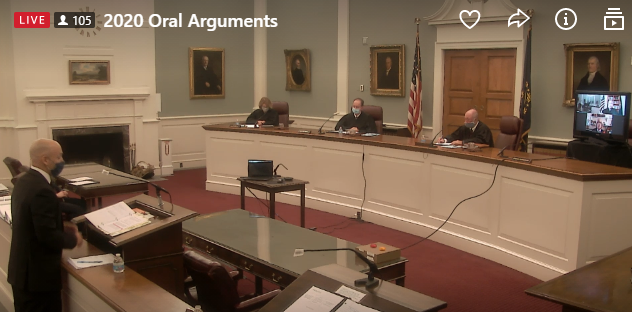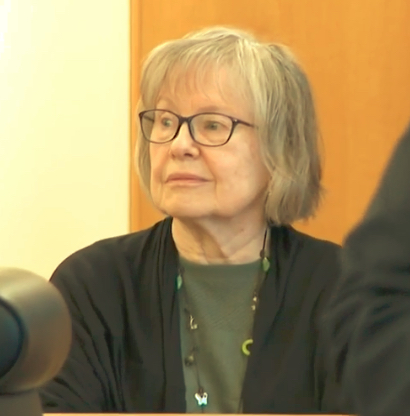By NANCY WEST, InDepthNH.org
The New Hampshire Center for Public Interest Journalism filed an objection Wednesday to the motion to delay proceedings until July 1 in its public records lawsuit seeking release of the unredacted Laurie List of dishonest police officers.
On behalf of the Center, attorney Andru Volinsky argued that last week’s partially assented to motion to stay was at least the second request for delay after the state Supreme Court ruled that the list was public.
The court remanded the case to Judge Charles Temple in Hillsborough Superior Court South to determine the privacy rights of the 280-plus officers on the list, which is now called the Exculpatory Evidence Schedule.
The lawsuit was filed in April of 2018 by six news outlets, including the New Hampshire Center for Public Interest Journalism and ACLU-NH.
ACLU-NH’s Gilles Bissonnette withdrew from representing the Center last fall. The Center is now represented by Volinsky and opposes any further delay in the case that was originally filed in April of 2018.
ACLU-NH and the other five newspapers agreed with the Solicitor General Dan Will after months of confidential negotiations to file the motion last Friday to delay proceedings until July 1 to see if House Bill 471 as recently amended passes the legislature.
If it does become law, they argue there will be no need for further litigation in the public records case because the Laurie List would become a public document.
But Volinsky said in Wednesday’s objection that the proposed settlement does not make any provision in case the legislature rejects House Bill 471. The amended bill will have its first scheduled hearing on Thursday, April 15.
“Even if the legislation is adopted precisely as drafted, the legislation strikes the wrong balance between the public’s right to know about the functioning of law enforcement officers and departments where serious misconduct allegations exist versus the privacy of individual officers,” Volinsky wrote.
Any officer on the list could tie up the release of his or her listing by filing litigation that presents a due process claim and prevent release of the listing until that litigation is completed, which could take years, Volinsky said.
“Finally, as if all of the tilting towards the listed officer were not enough, the whole EES (Laurie List) is made completely discretionary,” Volinsky wrote.
See full objection here. https://indepthnh.org/wp-content/uploads/2021/04/Objection-to-Motion-for-Stay-4-13-21-6.pdf
“Under the legislation, the Department of Justice need not maintain the EES at all…This balance, akin to ‘prior restraint,’ see New York Times v. United States, 403 U.S. 713 (1971) (regarding the Pentagon Papers), unduly favors the officer involved and is inconsistent with existing case law,” Volinsky said.
Bissonnette continues to represent the petitioners that agreed to file the motion to delay, including The Telegraph of Nashua, Newspapers of New England, Inc., Seacoast Newspapers, Inc., Keene Publishing Corporation, and the ACLU-NH. Attorney Gregory Sullivan represents the Union Leader Corp.
They argue in agreement with Solicitor General Will: “The proposed statute (House Bill 471) codifies a recommendation from the New Hampshire Commission on Law Enforcement, Accountability, Community, and Transparency (‘LEACT Commission’) that the EES be made public after every officer on the list has been notified that he or she is on the EES and has been informed that he or she has up to 180 days to decide whether to challenge his or her inclusion on the EES.”
See motion to stay and House Bill 471 here. https://indepthnh.org/wp-content/uploads/2021/04/Partially-Joint-Motion-to-Stay-1.pdf
The case was first argued before Judge Temple on Oct. 19, 2018. On April 24, 2019, Temple ruled in favor of the news outlets and ACLU-NH saying the Laurie List is a public record and is not exempt under the state’s right-to-know law.
Former Attorney General Gordon MacDonald appealed Judge Temple’s order to the state Supreme Court, which ruled on Oct. 30, 2020, that the list is a public document, but sent the case back to Judge Temple to determine the privacy rights of the officers on the list.
See copy of the April 2020 Laurie List here: https://drive.google.com/file/d/1PumiMcSlQCBqCm9sKkBYNJFUu10GWE8-/view?ts=5f371bab
The list contains the redacted name, the unredacted department, brief details about the discipline that landed the officer on the list and some entries include the date the officer was placed on the list. Also redacted is the date of the incident.
The list is maintained to alert prosecutors when their constitutional obligation kicks in to provide defendants with exculpatory evidence, including evidence in a police officer’s confidential personnel file that indicates discipline for dishonesty or excessive force.
Defendants who have been denied all of the evidence favorable to them before trial can later petition for a new trial. In egregious cases, the prosecutor could face discipline for withholding such evidence.
Disclaimer: The NH Center for Public Interest Journalism publishes online this news outlet, InDepthNH.org




